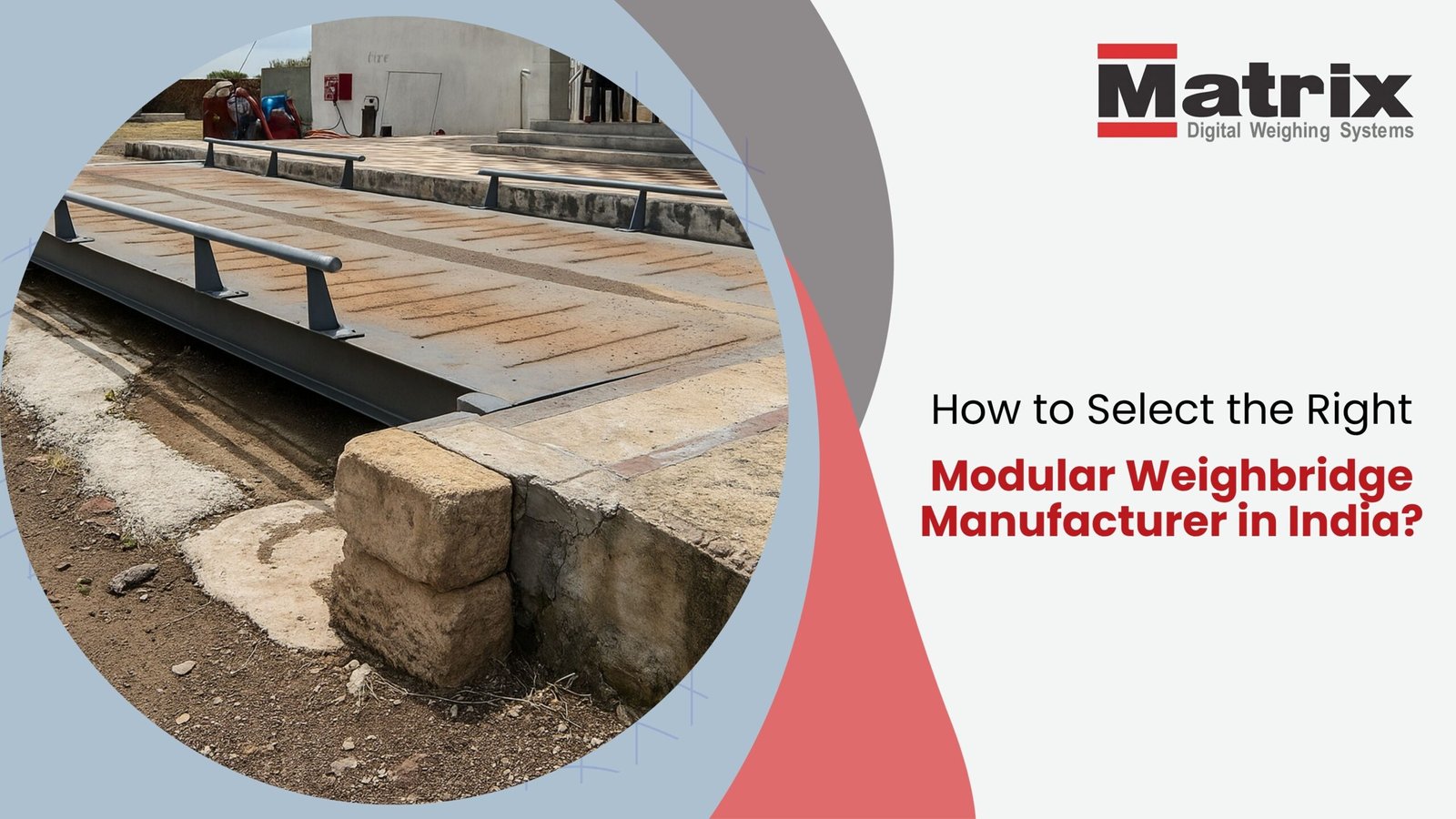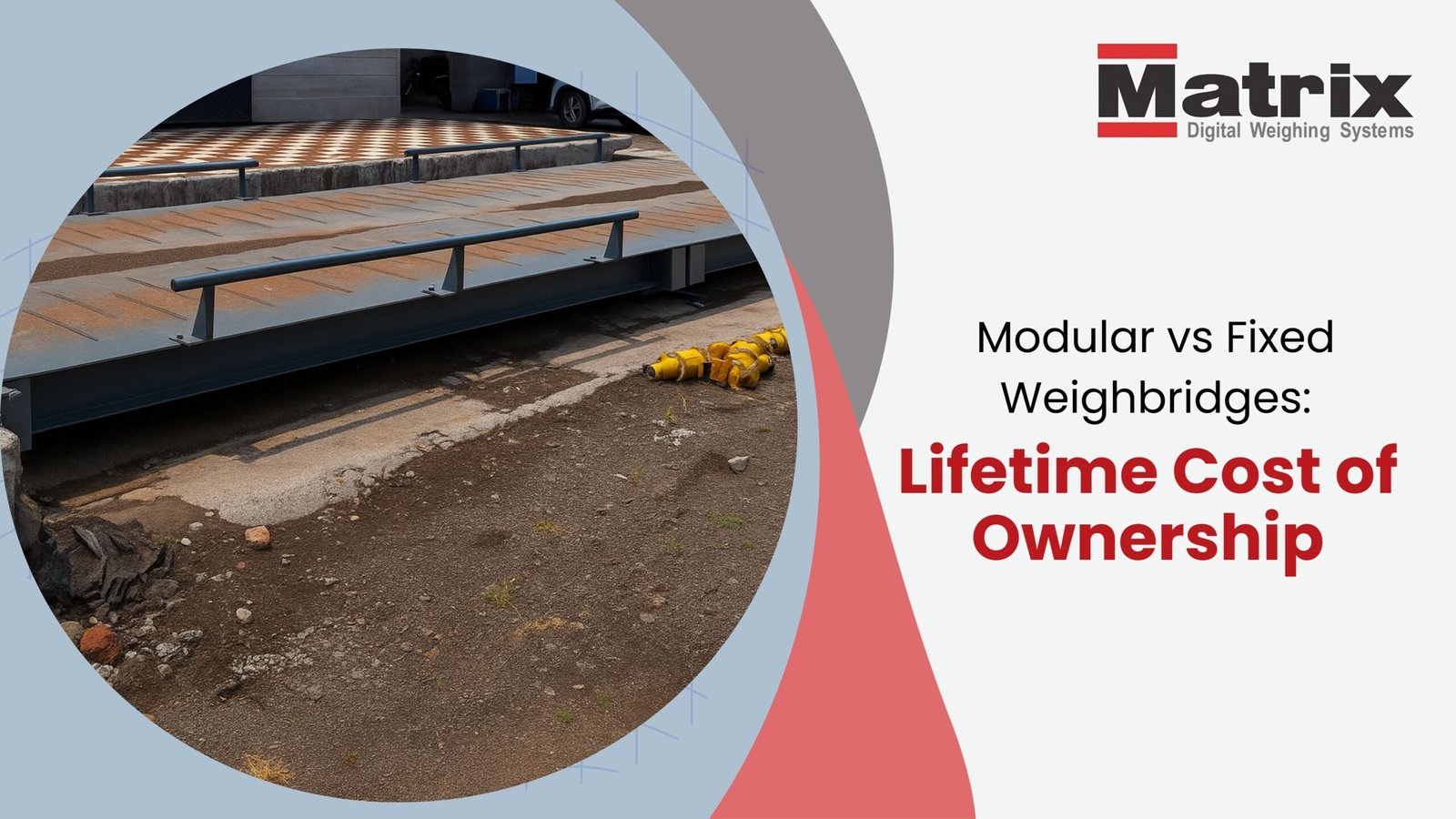How to Select the Right Modular Weighbridge Manufacturer in India?

Introduction
Most companies make weighbridge purchases based on price alone—and regret it within two years. Installation problems surface. Calibration drifts. Support vanishes when you need it most. Selecting the right modular weighbridge manufacturer prevents these headaches and protects your investment over decades of use.
This guide walks through the technical, operational, and service criteria that separate reliable manufacturers from ones who leave you stranded. You’ll see specific evaluation parameters, compliance requirements, and post-purchase support factors that determine long-term value.
Understanding Modular Weighbridges
Modular weighbridges consist of prefabricated steel sections that bolt together on site. Each module contains load cells and structural components engineered for precision weighing.
The modular design allows fast installation—typically one to three days versus a week or more for traditional concrete structures. You can relocate the system if your operations move or expand.
Why Modular Beats Traditional Construction?
Modular systems arrive pre-calibrated from the factory. This eliminates field welding that can compromise structural integrity. Weather delays don’t affect installation timelines the way concrete curing does.
Maintenance is simpler because individual modules can be replaced without dismantling the entire platform.
Key Considerations Before Choosing a Manufacturer
Operational Requirements
Start with capacity needs. Calculate your heaviest anticipated vehicle weight and add 20% margin. Undersized systems fail prematurely and void warranties.
Platform dimensions matter for vehicle types you’ll weigh. Multi-axle trucks need longer platforms than single-axle vehicles.
Site Conditions
Surface-mounted installations work when you can’t excavate. Pit-mounted versions sit flush with the ground for easier vehicle access. Your manufacturer should conduct a site survey before proposing a design.
Soil bearing capacity determines foundation requirements. Poor soil conditions increase installation costs but can’t be ignored.
What Defines a Reliable Manufacturer?
Experience and Track Record
Look for manufacturers operating for at least a decade. Industry experience translates to design refinements that prevent common failure modes.
Ask for installation references in your sector. Agricultural operations have different requirements than logistics warehouses.
Manufacturing Quality
High-quality manufacturers use shot blasting and epoxy coating on steel surfaces. This prevents corrosion that weakens the structure over time.
Load cell technology determines accuracy. Manufacturers who use precision-grade load cells with temperature compensation deliver consistent results across seasons.
Customization Capability
Standard designs rarely fit every application perfectly. Your manufacturer should modify platform dimensions, capacity ratings, and software features to match your workflow.
Integration with existing ERP or logistics systems requires custom API development. Manufacturers who offer this save you from manual data entry.
Essential Product Features to Look For
- Structural Components: Look for 6mm minimum deck plate thickness. Thinner plates flex under load and reduce accuracy.
- Load Cell Protection: Quality systems mount load cells in sealed housings that prevent water and dust intrusion. Exposed load cells fail quickly in industrial environments.
- Digital Control Units: Modern controllers should support multiple weighing modes, vehicle identification, and automated report generation.
- Modular Flexibility: Individual sections should disconnect for transport or reconfiguration without cutting or welding.
Compliance and Certification Requirements
Legal Metrology certification isn’t optional for commercial transactions. Your weighbridge must comply with regulations that govern trade weighing.
ISO certification indicates the manufacturer follows quality management systems. BIS standards apply specifically to Indian market requirements.
Manufacturers who handle certification paperwork save you from navigating bureaucratic processes. This includes periodic verification schedules required by law.
After-Sales and Support Factors
Installation and Calibration
Professional installation teams should handle foundation checks, module assembly, and load cell calibration. DIY installation voids most warranties.
Initial calibration requires certified test weights that match your scale capacity. Manufacturers who provide this equipment demonstrate commitment to accuracy.
Ongoing Support
Service response time determines how long your operations halt when problems occur. Local service centers reduce downtime compared to distant support.
Annual Maintenance Contracts cover calibration verification, load cell checks, and software updates. These prevent accuracy drift and extend system life.
Spare parts availability matters for older systems. Manufacturers who stock components for discontinued models protect your long-term investment.
Comparing Manufacturer Proposals
Request detailed quotations that break down costs for equipment, installation, calibration, and warranty terms. Hidden charges appear during installation when specifications aren’t clear.
Compare warranty periods. Standard warranties cover one year; premium manufacturers offer three to five years on structural components.
Lead time affects project schedules. Manufacturers with inventory can deliver within weeks; custom builds take two to three months.
Technology Integration Capabilities
Modern weighbridges connect to RFID systems for vehicle identification, eliminating manual data entry. Your manufacturer should support these protocols.
Cloud-based reporting lets managers monitor multiple weighbridge locations remotely. This visibility improves operational control across distributed sites.
Software integration with accounting systems automates invoicing based on weight data. Manual reconciliation wastes time and introduces errors.
FAQs
Q: How do I verify a manufacturer’s quality claims?
A: Request site visits to existing installations similar to your application. Talk directly with facility managers about their experience with accuracy, downtime, and support responsiveness. Physical inspections reveal more than sales presentations.
Q: What’s the realistic lifespan of a modular weighbridge?
A: Quality modular systems last 15 to 20 years with proper maintenance. Steel corrosion is the main degradation factor. Systems with protective coatings and sealed load cells reach the upper end of this range.
Q: Can I relocate a modular weighbridge later?
A: Yes. Modular construction allows complete disassembly and reinstallation at new locations. You’ll need recalibration after moving, but the core structure remains functional. Traditional concrete weighbridges can’t be relocated.
Q: How often does calibration need to happen?
A: Legal requirements mandate annual calibration for commercial weighing. High-volume operations benefit from semi-annual checks to catch drift early. Manufacturers should provide calibration services or certify your maintenance team.
Q: What causes accuracy problems over time?
A: Load cell damage from overloading, water intrusion into junction boxes, and structural flex from weakened deck plates. Regular inspections catch these issues before they affect weighing accuracy significantly.
Conclusion
Manufacturer selection determines whether your modular weighbridge delivers decades of reliable service or becomes a maintenance burden. Focus on structural quality, certification compliance, and after-sales support rather than initial price alone. Request site references, verify manufacturing processes, and confirm local service availability before making your decision.
Matrix Weighbridge manufactures modular weighbridge systems engineered for Indian industrial conditions. Our installations combine precision load cells, corrosion-resistant construction, and comprehensive support to deliver accuracy you can rely on year after year.
Ready to specify the right weighbridge for your operation? Visit matrixweighbridge.com to review our modular weighbridge range, request a site assessment, or speak with our technical team about customization options for your facility.

